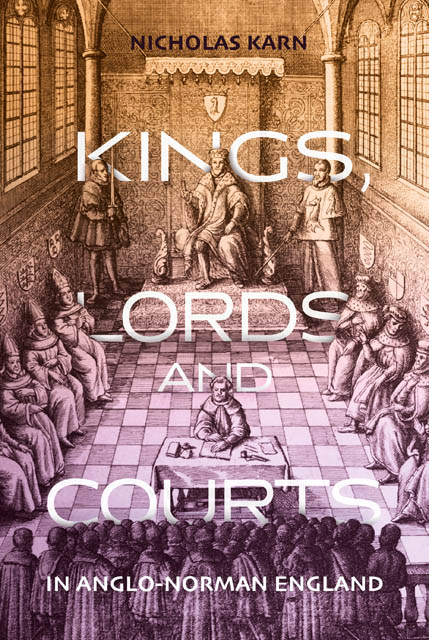Book contents
- Frontmatter
- Dedication
- Contents
- Preface and Acknowledgements
- List of Abbreviations
- Introduction
- 1 Lords and their Dependents in Court: The Later Anglo-Saxon Paradigm
- 2 The Aspirations of Lords in Eleventh- and Twelfth-Century England
- 3 Private Claims and Hundreds in the Later Eleventh and Earlier Twelfth Centuries
- 4 The Division of Hundreds and the Proliferation of Courts
- 5 From Debate within Courts to Debate between Courts: The Origins of Jurisdictional Debate
- 6 Courts, Pleas and Kings in the Early Twelfth Century
- 7 Pleas and Justices in the Early Twelfth Century
- Conclusion
- Appendix: The Evidence for Justices, 1100–54
- Bibliography
- Index
Conclusion
Published online by Cambridge University Press: 18 January 2023
- Frontmatter
- Dedication
- Contents
- Preface and Acknowledgements
- List of Abbreviations
- Introduction
- 1 Lords and their Dependents in Court: The Later Anglo-Saxon Paradigm
- 2 The Aspirations of Lords in Eleventh- and Twelfth-Century England
- 3 Private Claims and Hundreds in the Later Eleventh and Earlier Twelfth Centuries
- 4 The Division of Hundreds and the Proliferation of Courts
- 5 From Debate within Courts to Debate between Courts: The Origins of Jurisdictional Debate
- 6 Courts, Pleas and Kings in the Early Twelfth Century
- 7 Pleas and Justices in the Early Twelfth Century
- Conclusion
- Appendix: The Evidence for Justices, 1100–54
- Bibliography
- Index
Summary
Shires and hundreds were created across England during the tenth century, and their operations were recorded in detail in the Anglo-Saxon laws, which have done so much to form ideas about how the new kingdom of England worked. Hundreds in particular had an important role as local assemblies, in which people would gather to see justice done to one another, and in which local communities, with all their dysfunctions and intimacies, sat in judgement upon themselves. The model set out in the laws was not long-lived, however. By the middle of the eleventh century it seems that already the unitary model of the hundred was starting to break down, and decay accelerated and became general into the twelfth century. The pattern of hundreds was remodelled as lords seized control of parts of it; either they claimed whole hundreds themselves, or they created lesser units which were originally subsets of hundreds and which were accountable to them, which came to be known as the halimota. The hundred managed by a lord and the halimota were mechanisms which allowed lords to raise exclusive claims over their dependents, and to monopolise lordship.
The halimota represented not just a change in how courts worked, but was also a step, and probably an important step, in the process of manorialisation, in which lordship, society and economy were progressively reconfigured. Later Anglo-Saxon lordship was multiple and many-sided; it was possible for one individual to owe different things to many different lords, because they might exercise lordship in different forms, or might exercise lordship in relation to different pieces of land, among other possible variations. In negotiating relationships with multiple lords, many peasants had a measure of agency, and their relationship to any one lord meant that it would have been harder for another to assert exclusive claims of lordship, because such a claim would have implications not merely for the peasant, but also for the other lords. Such complex lordship only worked because peasants were visible to many lords in public arenas such as the hundreds. Yet, it seems to have been a widespread aspiration among lords that they should be able to monopolise claims over those who were beneath them. This meant that they would have had exclusive claims over their resources and labour, and would have needed to prevent other lords making demands over their dependents.
- Type
- Chapter
- Information
- Kings, Lords and Courts in Anglo-Norman England , pp. 204 - 207Publisher: Boydell & BrewerPrint publication year: 2020



